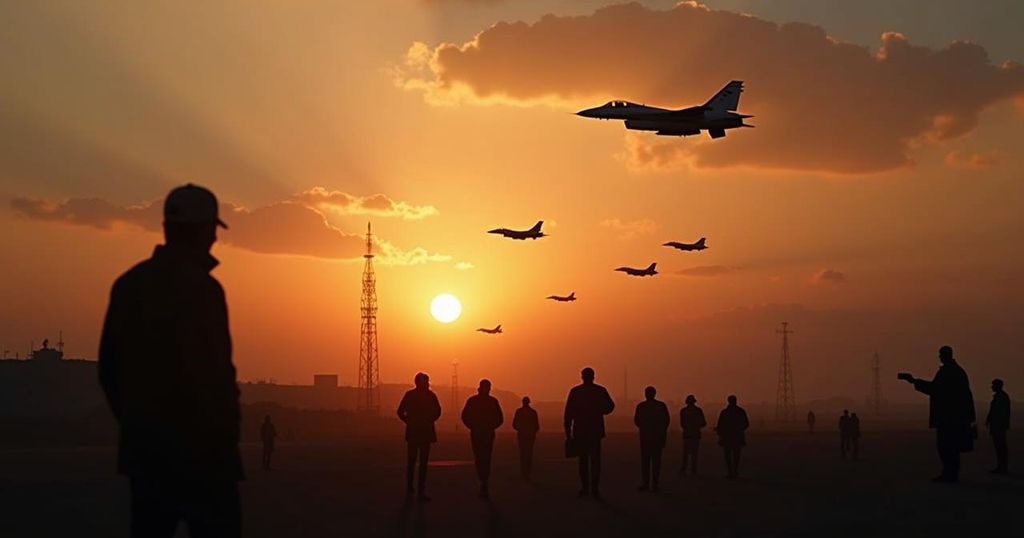Egyptian Airspace Remains Operational Amid Regional Tensions Following Iranian Missile Attacks
Egypt’s airspace remains secure and operational following Iran’s missile strikes on Israel. The Egyptian Ministry of Civil Aviation reassured travelers of safety and ongoing air traffic, with increased alertness at Cairo airport due to regional airspace closures. Iran launched nearly 200 missiles, marking a significant escalation in military conflict following targeted attacks on key leaders and subsequent Israeli military actions, amid international calls for a ceasefire.
On October 2, 2024, the Egyptian Ministry of Civil Aviation announced that the country’s airspace remains secure and operates normally despite the recent missile strikes by Iran on Israel. This affirmation aims to reassure travelers amidst rising regional tensions. The ministry clarified that air traffic continues as per usual protocols and emphasized active coordination with neighboring nations, particularly in light of closures of Jordanian and Iranian airspace in connection with the ongoing conflicts. One notable incident involved EgyptAir flight MS 701, which had to return to Cairo International Airport following Jordan’s airspace closure. The public relations teams for EgyptAir and Cairo airport provided support to the affected passengers. In anticipation of possible diversions due to regional airspace restrictions, Cairo airport has heightened its alert status. Travelers to Baghdad, Erbil, and Jordan have been encouraged to verify their flight arrangements as updates to the situation will be provided consistently. In a major military escalation, Iran launched approximately 200 missiles targeting Israeli military sites, marking the most extensive Iranian attack on Israel to date. This military operation was stated to be a response to the recent killings of key figures, such as Hassan Nasrallah, leader of Hezbollah, and Hamas leader Ismail Haniyeh. Reports indicate that nearly 1,900 individuals have lost their lives, with over 9,000 injured due to ongoing clashes since the resurgence of the Israeli-Palestinian conflict in October 2023. This violence has largely escalated following Israeli airstrikes in Lebanon and the start of a ground offensive in the region. Amid these rising tensions, calls for a ceasefire have been issued by Egypt, the United Nations, and other global leaders, stressing the urgent need for a resolution amidst the reported casualties that have surpassed 41,600 Palestinians in Gaza due to relentless military operations. Despite numerous international appeals for de-escalation, Israel has maintained its military actions against various factions, raising fears of a broader conflict. Israeli Prime Minister Benjamin Netanyahu has vowed to deliver a decisive response to the Iranian missile assault, with Israel’s envoy to the UN threatening painful repercussions for Iran. The U.S. government echoed these sentiments, expressing its commitment to working alongside Israel to respond substantively to Iranian provocations. Concurrently, Iranian military forces claimed successful deployment of hypersonic missiles during the attack, asserting a high accuracy rate in their targets within Israel. The ongoing turbulence has prompted calls for a comprehensive ceasefire, particularly from the European Union and the United Nations, as critical discussions loom over the future of Middle Eastern peace efforts.
The situation in the Middle East is currently fraught with conflict, particularly between Israel and various militant groups, including Hezbollah and Hamas. The recent hostilities have escalated due to Iranian military responses to Israeli actions perceived as provocations, including targeted assassinations of key leaders. The region has seen a spike in military engagements since October 2023, resulting in extensive casualties and humanitarian crises, prompting international calls for ceasefire and diplomatic resolutions to prevent further escalation.
In summary, the Egyptian Ministry of Civil Aviation has confirmed the security and regular operation of its airspace despite the recent Iranian missile attack on Israeli targets. This incident underscores the volatile nature of the current geopolitical landscape in the Middle East, with significant military actions and retaliatory threats unfolding. The need for a ceasefire and diplomatic efforts remains critical, as the consequences of continued hostilities could lead to broader regional instability.
Original Source: www.egypttoday.com




Post Comment